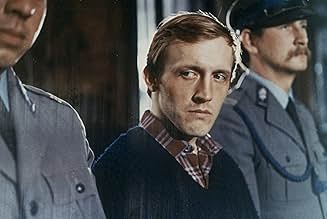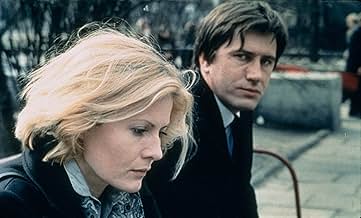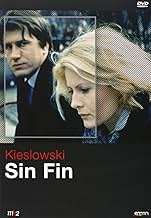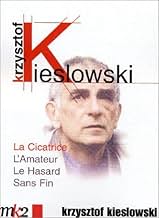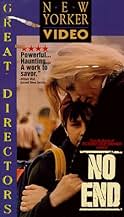CALIFICACIÓN DE IMDb
7.3/10
6.1 k
TU CALIFICACIÓN
En 1982, Polonia está bajo ley marcial y la solidaridad está prohibida. Ulla, una traductora, pierde a su marido Antek y se ve poseída por el dolor de la pérdida.En 1982, Polonia está bajo ley marcial y la solidaridad está prohibida. Ulla, una traductora, pierde a su marido Antek y se ve poseída por el dolor de la pérdida.En 1982, Polonia está bajo ley marcial y la solidaridad está prohibida. Ulla, una traductora, pierde a su marido Antek y se ve poseída por el dolor de la pérdida.
- Dirección
- Guionistas
- Elenco
Danny Webb
- American
- (as Daniel Webb)
Jacek Domanski
- Dzialacz opozycji
- (sin créditos)
- Dirección
- Guionistas
- Todo el elenco y el equipo
- Producción, taquilla y más en IMDbPro
Opiniones destacadas
The narrative in this film is far too flawed. There are two intertwining halves of it, one good, one poor. The good one involves a woman, Ulla, whose husband died suddenly and unexpectedly one morning while he waited in his car to take their son to school. Now he gently haunts his family as they deal with the pain. The acting is magnificent here. Kieslowski is masterful at directing his actors in material like this, as he would show a million different times in The Decalogue, made a few years later. There are a few outrageously and subtly powerful scenes. Most memorable is the one where Ulla decides to prostitute herself to a British tourist. This happens about a month after her husband has died. After the man has sex with her, she asks him if he speaks Polish. He says no, and then she begins to talk about her problems in Polish. The other half of the plot is utterly weak in comparison. The husband was a lawyer, and the defendant in the case he was working on is screwed because of the death. The defendant's wife comes to Ulla for help, and though she is refused help at first, Ulla eventually introduces her to her husband's mentor, a cynical old man about to be kicked out of the business. Perhaps it's just my aversion to lawyer and courtroom dramas, but I just didn't care a lick what happened in this part of the plot. Supposedly it's meant as a criticism against the Communist law at the time. I don't know. It's dull whatever it is. But the film is slightly worth watching, especially for the acting. Even in the parts that I didn't care for, the acting is exquisite. 7/10.
Although there is the obvious plot of the grieving wife, the movie is really about Poland under martial law. Probably unable to directly focus on such political topics, Kieslowski attempts to 'hide' this other side beneath a twisted Ghost subplot.
A dark movie, one that demands attentive viewing, this one will probably never be as successful as some of Kieslowski's other works, which have probably led its viewers to pick up this one.
A dark movie, one that demands attentive viewing, this one will probably never be as successful as some of Kieslowski's other works, which have probably led its viewers to pick up this one.
I state for the record that I did not understand this film fully. The second plot with Solidarnost protester imprisoned and released by the court is not completely clear to me. Yet it has little to do with politics and more with human condition (ideals, expectation, compromise). Prisoner's family doesn't react happily upon his immediate release in a court room. There is awkwardness and embarrassment in that scene, as if some unforgivable compromise has been made and it tainted all of their relationship. Accident scene with a death of motorist seems random but reoccurring theme in Kieslowskij movies. Randomness of death, randomness of existence. Movie is wonderfully shot , music (as always) is haunting. I just cannot put it all together in my mind like I could with Veronique.
I've began to follow Kieslowski over the past days, hoping to finally encounter his color films which I've seen for years pop up among the brilliant works. I watched this as background glimpse into his formative period. Interestingly he does two things:
One is he presents a world that has come undone and carries the past. A woman, her husband has died as the film begins, life has broken down and she has to go out and face it. Everything that she encounters is an echo from the past. Two instances that involve photos exemplify it; nude photos of her that her husband had found but he's now gone before she had a chance to explain, the other shows an idyllic summer that he possibly spent with another woman (before they met?). But also an old friend who now vies for her, a night of prostituting herself because he reminds her of her husband, being hypnotized to forget him conjures his presence, and round it goes from bewilderment to epiphany.
The other thing they do here is look to frame a response to bewilderment felt by Poles who had just been through strikes and martial law. A man is awaiting trial, different narratives are offered up by lawyers. Should he be pragmatic or protest? It's one of the threads that were left undone at the time of the husband's death who was a lawyer on the case. His own advice, which I perceive to be Kieslowski's, is for everyone to remove the distortions that prevent them from seeing each other.
Viewers who are content to encounter a life of episodic confusion will be happy with what he does. I miss a more penetratingly visual way of threading these events and, already from my brief glimpses into Dekalog, I believe it's this ability to surround and submerge causality that he's going to cultivate, a way of dreaming in advance. Here, tellingly, we have the husband announcing his own death in the very first shot whereas it could have been threaded as discovery and glimpsed in a haze (he already tries this by the first episode of Dekalog).
One is he presents a world that has come undone and carries the past. A woman, her husband has died as the film begins, life has broken down and she has to go out and face it. Everything that she encounters is an echo from the past. Two instances that involve photos exemplify it; nude photos of her that her husband had found but he's now gone before she had a chance to explain, the other shows an idyllic summer that he possibly spent with another woman (before they met?). But also an old friend who now vies for her, a night of prostituting herself because he reminds her of her husband, being hypnotized to forget him conjures his presence, and round it goes from bewilderment to epiphany.
The other thing they do here is look to frame a response to bewilderment felt by Poles who had just been through strikes and martial law. A man is awaiting trial, different narratives are offered up by lawyers. Should he be pragmatic or protest? It's one of the threads that were left undone at the time of the husband's death who was a lawyer on the case. His own advice, which I perceive to be Kieslowski's, is for everyone to remove the distortions that prevent them from seeing each other.
Viewers who are content to encounter a life of episodic confusion will be happy with what he does. I miss a more penetratingly visual way of threading these events and, already from my brief glimpses into Dekalog, I believe it's this ability to surround and submerge causality that he's going to cultivate, a way of dreaming in advance. Here, tellingly, we have the husband announcing his own death in the very first shot whereas it could have been threaded as discovery and glimpsed in a haze (he already tries this by the first episode of Dekalog).
Mesmerising, if only for the performance by Grazyna Szapolowska as the widow who moves through the film and ignites every scene. Beautiful and tragic at once she emanates power over the audience and one cannot turn away. I had not realised how much this film must have influenced some established mainstream films that we assume to be original. Obviously many of them owe a great debt to this story. Told unflinchingly by Kieslowski in a unshowy manner it still demonstrates moments of brilliant insights into the human condition. The pain and torture we must endure after such heartache runs through the the heart of this film. I particularly liked the little moments as always, such as the glass slipping through her fingers, the dog trying to get in the car, the dirt on her hands from the bumper whilst witnessing the accident, the hypnotherapy session where she sees him. All simple and yet so elegant. No hammering it through to the audience with big signposting saying 'Remember this for later!'. Why don't more films treat the audience with a tiny bit more intelligence or is the majority of film going to assume we are all thick. And just because a film is mainstream doesn't mean it has to be low brow. Godfather, Deer Hunter, French Connection? Very strong films? If you see this also see Amator.
¿Sabías que…?
- TriviaThe film takes place in 1982.
- Citas
[First lines]
Antek Zyro: [speaking directly to the camera] I died - four days ago.
Selecciones populares
Inicia sesión para calificar y agrega a la lista de videos para obtener recomendaciones personalizadas
- How long is No End?Con tecnología de Alexa
Detalles
Contribuir a esta página
Sugiere una edición o agrega el contenido que falta

Principales brechas de datos
By what name was Sin final (1985) officially released in India in English?
Responda
